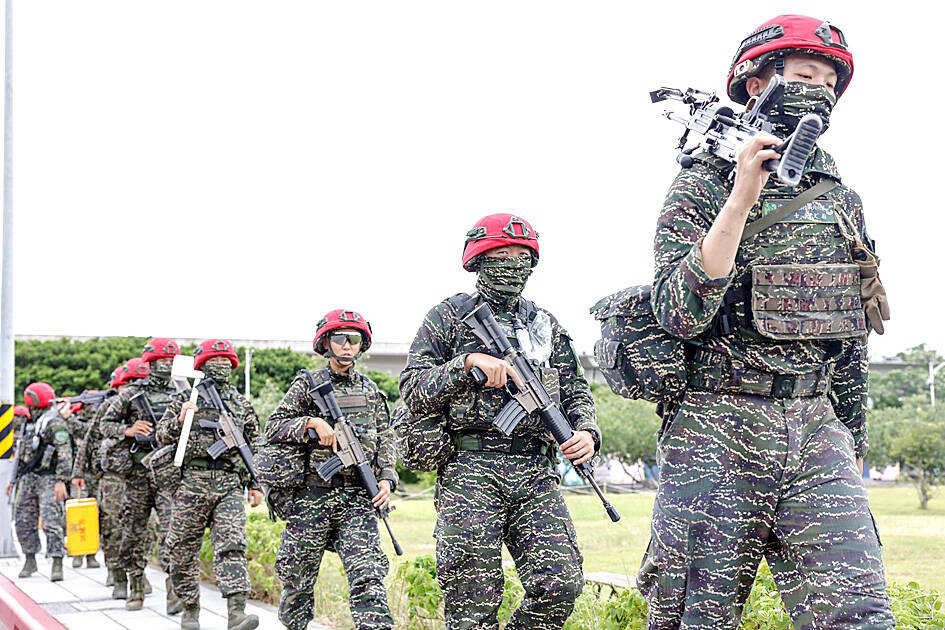The armed forces have 155,218 volunteers in active service, the fewest professional soldiers in the military in the past five years, a report published earlier this month by the Legislative Yuan’s Budget Center showed.
Although the military has received the final deliveries related to multiple arms deals, the weapons systems would likely not prove effective if the nation lacks the necessary number of highly trained soldiers to operate them, the center report said.
The Ministry of National Defense listed a NT$220.5 billion (US$6.85 billion) budget for next year, which represents a 7.67 percent increase in spending over the current year, the report said.

Photo: I-hwa Cheng, Bloomberg
Military investments related to arms procurements are to increase 34.65 percent and would become the fastest-growing spending item in the budget, it said.
Volunteer service members are the backbone of the military’s combat strength, and staffing requirements for professional soldiers are not alleviated by extending the length of the conscription period, it said.
The center said the strength of the volunteer forces peaked in 2021 before declining annually, while many principal combat units designated as Class 1 are below 80 percent of their authorized strength.
The military had 162,039 volunteers in 2019, 164,063 volunteers in 2020, 164,884 volunteers in 2021 and 159,392 volunteers last year, it said.
The dearth of personnel is likely to impede the armed forces’ ability to train and retain soldiers with the skills necessary to operate advanced military equipment, it said.
The program to recruit prospective soldiers and officers through reserve cadet programs embedded in high schools, vocational colleges and universities has not achieved the desired effect, the center said.
Although the Ministry of National Defense has established reserve cadet programs in 410 high schools and vocational high schools since 2018, the number of enlistments from the cadet programs at all levels of schools has fallen every year since 2020, it said.
These programs reported 9,616 enlistments in 2020, 8,293 in 2021 and 7,409 last year, it said.
The drop in enlistments occurred despite the ministry’s steady funding of the programs, which increased to NT$39.89 million last year from NT$14.43 million in 2019, the center said.

DAREDEVIL: Honnold said it had always been a dream of his to climb Taipei 101, while a Netflix producer said the skyscraper was ‘a real icon of this country’ US climber Alex Honnold yesterday took on Taiwan’s tallest building, becoming the first person to scale Taipei 101 without a rope, harness or safety net. Hundreds of spectators gathered at the base of the 101-story skyscraper to watch Honnold, 40, embark on his daredevil feat, which was also broadcast live on Netflix. Dressed in a red T-shirt and yellow custom-made climbing shoes, Honnold swiftly moved up the southeast face of the glass and steel building. At one point, he stepped onto a platform midway up to wave down at fans and onlookers who were taking photos. People watching from inside

A Vietnamese migrant worker yesterday won NT$12 million (US$379,627) on a Lunar New Year scratch card in Kaohsiung as part of Taiwan Lottery Co’s (台灣彩券) “NT$12 Million Grand Fortune” (1200萬大吉利) game. The man was the first top-prize winner of the new game launched on Jan. 6 to mark the Lunar New Year. Three Vietnamese migrant workers visited a Taiwan Lottery shop on Xinyue Street in Kaohsiung’s Gangshan District (崗山), a store representative said. The player bought multiple tickets and, after winning nothing, held the final lottery ticket in one hand and rubbed the store’s statue of the Maitreya Buddha’s belly with the other,

‘NATO-PLUS’: ‘Our strategic partners in the Indo-Pacific are facing increasing aggression by the Chinese Communist Party,’ US Representative Rob Wittman said The US House of Representatives on Monday released its version of the Consolidated Appropriations Act, which includes US$1.15 billion to support security cooperation with Taiwan. The omnibus act, covering US$1.2 trillion of spending, allocates US$1 billion for the Taiwan Security Cooperation Initiative, as well as US$150 million for the replacement of defense articles and reimbursement of defense services provided to Taiwan. The fund allocations were based on the US National Defense Authorization Act for fiscal 2026 that was passed by the US Congress last month and authorized up to US$1 billion to the US Defense Security Cooperation Agency in support of the

HIGH-TECH DEAL: Chipmakers that expand in the US would be able to import up to 2.5 times their new capacity with no extra tariffs during an approved construction period Taiwan aims to build a “democratic” high-tech supply chain with the US and form a strategic artificial intelligence (AI) partnership under the new tariffs deal it sealed with Washington last week, Taipei’s top negotiator in the talks said yesterday. US President Donald Trump has pushed Taiwan, a major producer of semiconductors which runs a large trade surplus with the US, to invest more in the US, specifically in chips that power AI. Under the terms of the long-negotiated deal, chipmakers such as Taiwan Semiconductor Manufacturing Co (TSMC, 台積電) that expand US production would incur a lower tariff on semiconductors or related manufacturing